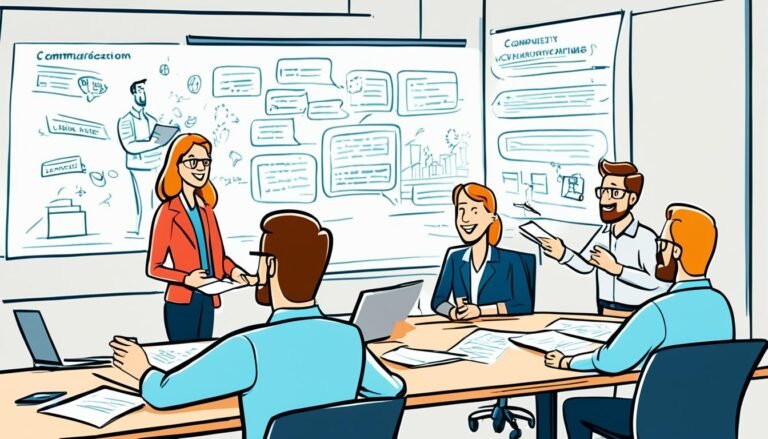Diplomacy as a Soft Skill
Mastering diplomacy as a soft skill empowers you to enhance communication, resolve conflicts effectively, and nurture positive relationships. Diplomacy is a versatile tool in today's interconnected world, enabling you to navigate diverse scenarios with finesse and grace. By developing diplomatic skills, you can foster mutual understanding, promote cooperation, and create a harmonious environment. Embracing diplomacy not only opens doors to growth and collaboration but also equips you with invaluable tools for success in all aspects of life. Harnessing the power of diplomacy to elevate your interactions and make a positive impact in your personal and professional spheres.
Key Takeaways
- Diplomacy as a soft skill involves tact, empathy, and strong communication abilities.
- It enhances conflict resolution and fosters positive relationships.
- Diplomatic individuals excel in navigating complex interpersonal dynamics with finesse.
- Developing diplomatic skills leads to effective communication and understanding.
- Diplomacy promotes collaboration, growth, and mutual respect in various interactions.
The Significance of Diplomacy
Understanding the significance of diplomacy is essential in maneuvering through intricate interpersonal relationships and fostering effective communication. Diplomatic negotiation plays a pivotal role in resolving conflicts and reaching agreements that benefit all parties involved. In the domain of international relations, the art of diplomacy is vital for maintaining peace and cooperation among nations. It serves as a tool for fostering mutual understanding and finding common ground even in the face of differing perspectives.
Cross-cultural communication is another aspect where diplomacy shines, bridging the gap between people from diverse backgrounds. By approaching interactions with cultural sensitivity and open-mindedness, diplomatic individuals can prevent misunderstandings and promote harmony. Conflict prevention is a key outcome of diplomatic skills, as they enable individuals to navigate sensitive issues with tact and grace, diffusing tensions before they escalate.
In essence, diplomacy isn't just an essential skill; it's a powerful tool for building relationships, resolving disputes, and fostering collaboration on both personal and global levels.
Characteristics of Diplomatic Individuals
To embody the qualities of a diplomatic individual, you must demonstrate tact, empathy, and effective communication skills. Diplomatic individuals excel in maneuvering through complex interpersonal dynamics with finesse, displaying a high level of social awareness. They possess emotional intelligence, allowing them to comprehend and manage their emotions and those of others with grace. Conflict management is a key skill for diplomatic individuals, as they can de-escalate tense situations and find amicable resolutions.
In addition to these attributes, diplomatic individuals are adept at active listening, ensuring that all parties feel heard and understood. They're skilled in adjusting their communication style to suit different personalities and situations, fostering positive relationships. Additionally, they approach disagreements with an open mind, seeking common ground and compromise.
Benefits of Developing Diplomatic Skills
Developing diplomatic skills can bring you various benefits, such as building positive relationships, resolving conflicts effectively, and enhancing your communication skills. These skills will enable you to navigate challenging situations with grace and tact, fostering a harmonious environment in both personal and professional settings.
Embracing diplomacy opens up opportunities for growth and collaboration, enriching your interactions and promoting mutual understanding.
Building Positive Relationships
By cultivating your diplomatic skills, you can foster harmonious and productive relationships with others, leading to mutual respect and understanding. Trust building is a key component of positive relationships. Diplomatic individuals are adept at creating an environment where trust can flourish naturally, enabling stronger connections and smoother interactions.
Additionally, conflict resolution is another crucial aspect of building positive relationships. Diplomatic skills empower you to navigate disagreements gracefully, finding solutions that satisfy all parties involved. By approaching conflicts with empathy, active listening, and a willingness to find common ground, you can transform tense situations into opportunities for growth and mutual understanding.
Embracing diplomacy in your interactions not only enhances your relationships but also paves the way for a more harmonious and collaborative environment.
Resolving Conflicts Effectively
Cultivating your diplomatic skills equips you with the tools to address conflicts effectively and foster a harmonious environment, benefiting both you and those around you. When conflicts arise, active listening is key. By truly understanding the perspectives of all parties involved, you can find common ground and build bridges towards resolution.
Implementing compromise strategies is another crucial aspect of conflict resolution. Being willing to meet halfway and consider alternative solutions shows respect for others' viewpoints and helps in reaching mutually beneficial agreements.
Enhancing Communication Skills
To enhance your communication skills effectively, consider the benefits that come with developing diplomatic skills. Active listening plays a vital role in diplomatic communication. By listening attentively to others, you show respect and build trust, which are essential elements of effective communication.
Additionally, diplomatic skills aid in conflict resolution. When faced with disagreements or misunderstandings, your ability to navigate these situations calmly and find common ground won't only help in resolving conflicts but also in strengthening relationships.
Practical Tips for Enhancing Diplomacy
Enhancing diplomacy requires a conscious effort to understand differing perspectives and communicate effectively with empathy and respect. To excel in this area, focus on building rapport and fostering teamwork. Start by actively listening to others. When you show genuine interest in their thoughts and feelings, you create a foundation of trust. Acknowledge their viewpoints, even if you disagree, as it validates their perspective.
Another practical tip is to practice empathy. Put yourself in the other person's shoes to understand their emotions and motivations. This approach helps in creating a harmonious environment where everyone feels heard and valued. Additionally, be mindful of your body language and tone of voice, as they play a significant role in how your message is received.
Moreover, seek common ground to establish connections. Highlight shared goals or values to unite individuals towards a common purpose. By emphasizing collaboration over competition, you can foster a sense of camaraderie and mutual respect. Remember, diplomacy isn't just about winning arguments but about building relationships that withstand challenges.
Diplomacy in Conflict Resolution
When addressing conflicts, it's essential to approach differing perspectives with empathy and respect.
By mediating opposing viewpoints, you can foster a collaborative environment that seeks common ground.
Promoting mutual understanding lays the foundation for constructive dialogue and sustainable resolutions.
Mediating Opposing Viewpoints
In mediating opposing viewpoints during conflict resolution, vital communication is essential for fostering understanding and reaching mutually beneficial solutions. Conflict resolution requires strong negotiation skills to navigate through differences and find common ground.
When mediating between conflicting parties, it's imperative to listen actively to each perspective, acknowledge the validity of their feelings, and guide them towards a collaborative approach. By demonstrating empathy and respect towards all parties involved, you can create a conducive environment for constructive dialogue.
Encouraging open communication and promoting a problem-solving mindset can help in breaking down barriers and finding solutions that address the interests of both sides. Remember, successful mediation in conflict resolution often hinges on your ability to navigate through differences with diplomacy and tact.
Finding Common Ground
To effectively navigate conflicts and foster resolution, it's essential to find common ground through respectful dialogue and understanding. When faced with opposing viewpoints, bridging differences is imperative in reaching mutually beneficial solutions.
By actively listening to all perspectives and acknowledging the validity of each side's concerns, you can pave the way for productive discussions. Fostering understanding involves recognizing the emotions and values underlying each viewpoint, allowing for empathy and connection to emerge.
Seek areas of agreement and build upon them to establish a foundation for compromise and collaboration. Remember, finding common ground doesn't mean compromising your principles but rather finding ways to work together towards a shared goal.
Diplomacy in conflict resolution hinges on your ability to navigate differences with grace and tact.
Promoting Mutual Understanding
Finding common ground through respectful dialogue and understanding is a key strategy in promoting mutual understanding in conflict resolution. By fostering empathy and promoting cultural awareness, you can navigate complex situations with grace and effectiveness.
Empathy allows you to see things from the perspective of others, paving the way for meaningful communication and connection. Additionally, promoting cultural awareness helps in recognizing and respecting the diversity of beliefs and values present in any conflict.
Cultivating Diplomacy in Everyday Interactions
Developing a habit of actively listening and empathizing can greatly enhance your ability to cultivate diplomacy in everyday interactions. In workplace dynamics, being diplomatic means maneuvering through differing opinions and conflicts with grace. By actively listening to your colleagues' perspectives and showing empathy towards their concerns, you can foster a more harmonious work environment. Acknowledging others' viewpoints, even when they differ from your own, demonstrates respect and understanding, leading to smoother collaborations and improved teamwork.
In social interactions, diplomacy plays a vital role in maintaining positive relationships. When engaging with friends, family, or acquaintances, practicing diplomacy involves being mindful of your words and actions to prevent misunderstandings or conflicts. By considering others' feelings and perspectives, you can communicate more effectively and build stronger connections. Diplomacy in everyday interactions is about finding common ground, respecting diversity, and promoting mutual understanding. Embracing these principles can help you navigate various social situations with tact and sensitivity, ultimately enhancing your relationships and fostering a culture of respect and collaboration.
Conclusion
Just as a skilled diplomat navigates through delicate negotiations with finesse and tact, mastering the art of diplomacy as a soft skill can open doors to success in all areas of life.
By cultivating your ability to communicate effectively, build relationships, and resolve conflicts gracefully, you can become a true master of diplomacy, creating harmony and understanding wherever you go.
Embrace the power of diplomacy, and watch as the world opens up to you like a beautifully orchestrated dance.








